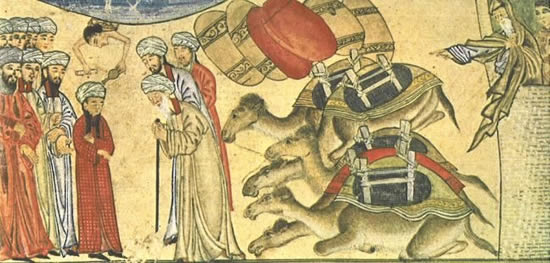穆罕默德
 穆罕默德(,約570年—632年6月8日)是伊斯蘭教的創立者及先知,同時是初期穆斯林社群的政治、宗教及軍事領導人。他的全名是艾布·卡西姆·穆罕默德·本·阿卜杜拉·本·阿卜杜勒·穆塔里布·本·哈希姆,一般都稱作穆罕默德,以往有馬哈麻、馬合麻等異譯,中國穆斯林尊稱為穆聖、馬聖人。
穆罕默德(,約570年—632年6月8日)是伊斯蘭教的創立者及先知,同時是初期穆斯林社群的政治、宗教及軍事領導人。他的全名是艾布·卡西姆·穆罕默德·本·阿卜杜拉·本·阿卜杜勒·穆塔里布·本·哈希姆,一般都稱作穆罕默德,以往有馬哈麻、馬合麻等異譯,中國穆斯林尊稱為穆聖、馬聖人。原本是阿拉伯富商的穆罕默德在40歲的時候獲得了他相信是真主的啟示,於是他開始向親朋戚友傳授他從中得知的信仰,得到許多人的追隨。在麥加受到迫害的穆罕默德隨後遷至麥地那,並成為當地的統治者。他在後來率領穆斯林征服了麥加,到他在632年逝世的時候,他和他的追隨者已經把伊斯蘭教信仰散播到阿拉伯各地。
穆斯林認為穆罕默德是眾多先知當中的最後一位,是「眾先知的封印」,意味著穆罕默德從天使所得的《古蘭經》訊息是真主最後的神啟。穆罕默德言行和態度被認為是模楷,伊斯蘭教學者視之為解釋、落實及補充了《古蘭經》。 維基百科提供
-
4481
-
4482
-
4483
-
4484
-
4485
-
4486
-
4487
-
4488
-
4489
-
4490
-
4491
-
4492
-
4493
-
4494
-
4495
-
4496
-
4497
-
4498
-
4499
-
4500
